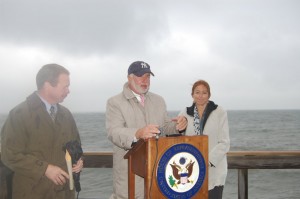Pols: No more dumping sewage in Sound

Although it’s illegal to dump untreated sewage in any local waters, treated sewage can be discharged in Long Island Sound. But not near Connecticut, Nassau County or western Suffolk.
Only near us, in the southeastern portion of the Sound.
Now, the state Department of Environmental Conservation has proposed to the federal government that it outlaw the practice, and the agency has the backing of local elected leaders. The state DEC filed the formal petition requesting the change to the Environmental Protection Agency.
The designation is “intended to restore [the] health and vitality of the Sound,” Congressman Tim Bishop (D-Southampton) said while standing on the Sound beach at Wildwood State Park.
“[It’s] a step in the right direction,” said Peter Scully, regional director of the state DEC. He said Long Island Sound faces many challenges, including excess nitrogen levels from stormwater, groundwater and atmospheric runoff.
State Assemblyman Marc Alessi (D-Shoreham) said the call to prevent discharge in the Sound comes at a time when there is greater awareness of the need for a healthy environment.
“There is still a high negative impact on aquatic life and even human health on this kind of dumping,” he said.
Mr. Scully said the designation could be officially adopted within the next six months. Enforcement would be the job of local bay constables, the U.S Coast Guard and DEC police. First-time violators would face fines of up to $500 fine and repeat offenders could be fined up to $1,000, according to a DEC spokesperson.
If adopted, the measure would require boaters to offload waste at one of 60 pump-out facilities located in the area. The EPA must determine if there are enough local pump-out facilities before declaring the area a no-discharge zone.
Mr. Scully said he is certain the agency will make the move.
[email protected]








